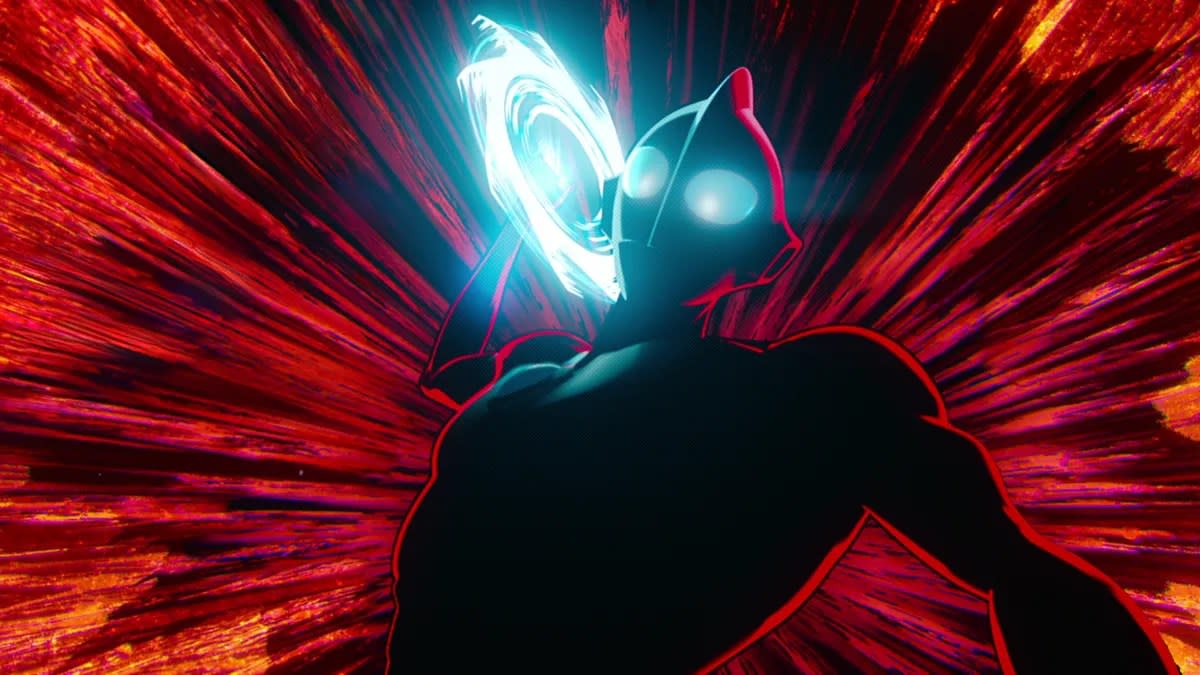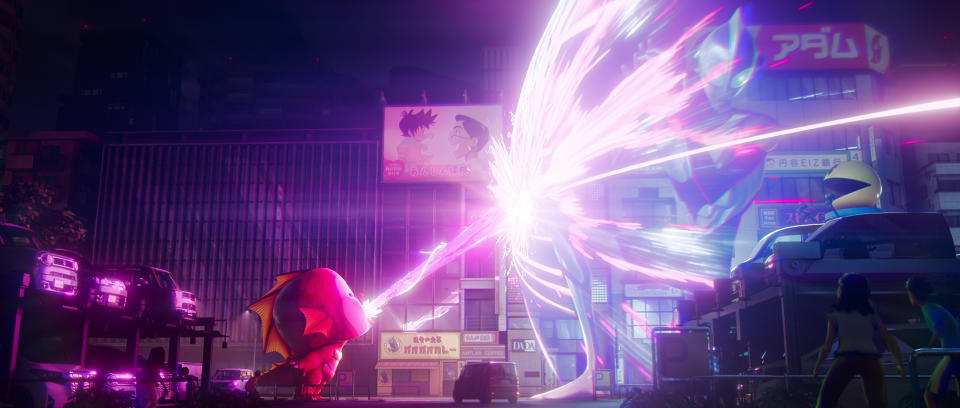‘Ultraman: Rising’ Review: A Japanese Icon Gets the Netflix Treatment in a Kid-Friendly Kaiju Adventure

One of the most storied franchises in contemporary pop culture, Japan’s “Ultra Series” has generated 44 movies, nearly 100 video games, countless pages of manga, and an endless parade of TV shows since Tsuburaya Productions first created the character in 1966 as a kid-friendly way of capitalizing on the success of kaiju phenomena like “Godzilla.” With such an illustrious legacy to its name, it might come as a surprise that Shannon Tindle’s “Ultraman: Rising” — an animated feature set in Tokyo but created entirely in the West — doesn’t require its preteen audience to know any of that, nor does it bother to fill them in along the way.
Unfolding like a family-oriented cross between “Pacific Rim” and “Big Hero 6,” this eye-popping CGI adventure makes no mention of the fact that its titular superhero is canonically an alien, just as it makes no attempt to explain why baseball star Ken Sato — an original character — and his estranged father can both transform into skyscraper-sized, Evangelion-esque fighting machines at the push of a button. Is Ultraman actually a robot, or does he just look that way because of his uncanny resemblance to the Iron Giant? Instead of straining to answer such questions, Tindle and Marc Haimes’ script focuses its attention on ensuring that any kid from around the world can watch along without a pressing need to ask them in the first place. The only barrier to entry here is a Netflix subscription.
More from IndieWire
Tempting as it is to demonize this movie as a test-run for the dark future of streaming, where a great promise (access to and enthusiasm for content from across the globe) is betrayed by a grim reality (the dilution of national iconography into flavorless slop with “universal appeal”), the reality is that “Ultraman: Rising” is a fun, sincere, and thoughtfully conceived piece of kids entertainment. And it’s liable to make young viewers more curious about the world around them — not less. At the very least, it maintains a healthy respect for how difficult it can be to balance domestic concerns with larger obligations.
That balance is something that Ken’s father, Professor Sato (voiced by Gedde Watanabe in the film’s top-flight English dub), presumably struggled with when his son was a child. But “Ultraman: Rising” does itself a deep and abiding disservice by not doing more to detail the previous Ultraman’s work-life balance. The only glimpse we get into Ken’s formative years comes during a brief prologue in which his dad has to duck out of the house to fight a kaiju that’s rampaging through Odaiba. When the story picks up again 20 years later, the Professor is an old man, Ken (Christopher Sean) is an egomaniacal baseball star for the L.A. Dodgers, and his mom has been “lost” for an undefined period of time.
When Ken receives the call to return to Japan and become the new Ultraman (under the guise of bringing his baseball talents to the Yomiuri Giants), the preening narcissist leaps at the chance to bask in the glory of being Tokyo’s biggest hero, even if no one will know that he’s the one doing it. The movie will tell us that Ken is motivated by attention, specifically the attention he never received from his absent father as a child, but denying us a chance to see the impact that absence had on him tends to stifle the emotional core of the movie that follows.
Kids won’t care — not when Tindle is telling them a story that can pivot from dramatic sports action to explosive, neon-soaked battle scenes at the drop of a bat. The fights between Ultraman and the Pokémon-like kaiju that stomp through Akihabara are a treat to watch, and take full advantage of the vibrant fluidity of the film’s animation (poppy without the usual CG gloss, and complemented by angular character designs shaded to seem like a cross between 3D renderings and manga drawings). They also mine some laughs from Ultraman’s relationship with an ungrateful public, who shout at him to “stop showboating and do his job” as he gets walloped by franchise mainstays like the dinosaurian Neronga.

That job isn’t made any easier by the fact that Ultraman refuses to kill the kaiju, who are really just big, scared animals looking for a way back home. Under the direction of Dr. Onda (Keone Young), whose family was killed in a kaiju attack a few decades earlier, the government-funded Kaiju Defense Force doesn’t share the same compunction. Needless to say, that discrepancy will cause a few extra headaches for Ken when he suddenly becomes a parent himself — not to a human newborn, but to a baby kaiju who imprints on Ultraman the moment it hatches.
Just like that, Ken is in the same position his father was when he was a boy, only much weirder. The adorable monster child who Ken is forced to keep safe is some 30 feet tall, fires lasers out of her mouth whenever she has acid reflux, and climbs Tokyo Tower like it’s a jungle gym when she escapes into the city. The size difference between Ken and his adopted daughter is a visual gift that keeps on giving, and the movie uses that reliable source of humor as permission to tell its story at a slightly slower pace than we’re used to seeing in mainstream American animation. There are more than enough antics to keep kids engaged (the baby kaiju is always learning new tricks), but “Ultraman: Rising” gradually shifts the brunt of its focus to the current state of the relationship between Ken and the elderly Professor Sato.
Ken may not have called his father a lot over the last 20 years, but that’s the funny thing about having a kid: You suddenly need your parents in a way you haven’t since you were a child yourself. More to the point: You suddenly understand them in a way you never have before. Ken is an insufferable buffoon even by the standards of a cartoon primadonna, but his initial jerkiness makes it that much easier for “Ultraman: Rising” to trace his dawning recognition of the dilemma that used to make life so difficult for his dad. Professor Sato’s superpowers made him strong enough to save the world, but they didn’t make him strong enough to save his family; he was his son’s first hero, in the way that so many parents are heroes to their children, but the history of Ultraman has taught us that all giants eventually shrink down to size.
Beneath the neon lights and the crunchy cheese guitar licks and the various montages of Ultraman teaching a baby kaiju to play baseball, this is really just a movie about how much easier it is to understand your parents when you become a parent yourself, and how fortunate you should feel if it’s not too late to share that understanding with them. The disconnect between Ken and Professor Sato is never detailed enough for their inevitable reconciliation to resonate as powerfully as it should, but “Ultraman: Rising” is still knowing, vital, and heartfelt in a way that allows it to survive without a richer sense of history.
“Ultraman’s most important task is finding balance,” Professor Sato explains at the start, and Ken will have to learn that lesson the hard way. But this story is only as satisfying for adults as it is for their kids because it gradually inverts that wisdom over the course of the movie — finding balance is what makes Ultraman a hero.
Grade: B
“Ultraman: Rising” premiered at the 2024 Annecy International Animation Film Festival. It will be available to stream on Netflix starting Friday, June 14.
Best of IndieWire
Sign up for Indiewire's Newsletter. For the latest news, follow us on Facebook, Twitter, and Instagram.
Solve the daily Crossword

